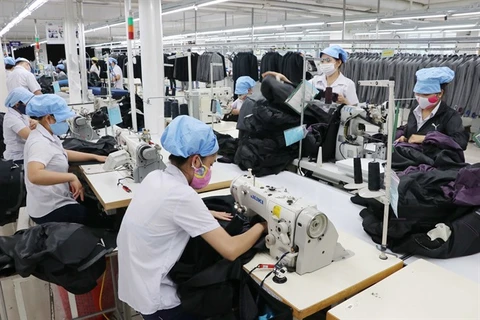 Workers need constant learning to adapt to modern production lines (Illustrative photo: VietnamPlus)
Workers need constant learning to adapt to modern production lines (Illustrative photo: VietnamPlus) Hanoi (VNA) - To bolster productivity, Vietnamese firms must not lag behind in the Fourth Industrial Revolution (Industry 4.0). As businesses begin using new technology, thousands of jobs are projected to disappear. This requires labourers to get accustomed to a constantly changing labour market.
Skill requirements will change
Industry 4.0 will improve productivity and economic efficiency, former Deputy Minister of Labour, Invalids and Social Affairs Pham Minh Huan has said. However, it also affects workers and results in layoffs as mechanisation begins. When businesses restructure and apply technology in production, some workers will become redundant.
About 75 percent of Vietnamese workers are projected to be affected by Industry 4.0. The hardest-hit sectors will be those that recruit a large number of workers such as garment-textile and footwear; along with workers in factories and cashiers. Besides, various new jobs are drawing jobs in mechatronic engineering, industrial automation, information technology and cloud computing, among others.
According to a report on career prospects and skill trends in Vietnam in 2018-2022 by the Navigos Group, current high-demand jobs are set to experience lower demand in the next five years due to Industry 4.0. Human resources (HR) specialists have emphasised that various soft skills which are currently highly valued will no longer be a priority, but a proactive learning attitude will be needed instead.
Experts said that Industry 4.0 will change the nature of jobs in the future. Nevertheless, the largest impact will not necessarily be lost jobs, but the change in recruitment demands.
In the near future, scientific and technological factors will change the nature of many jobs, resulting in requirements for more complicated skills, like teamwork, evaluation, decision-making, HR management and creative thinking, among others. Especially, HR specialists said learning readiness will become a worker’s most essential basic skill.
Improving human resources quality
With a total workforce of nearly 56 million people, Vietnam holds a huge advantage in attracting foreign investment. However, a report of ManpowerGroup Vietnam showed that skilled workers account for only 11 percent of the figure. As technological advances change organisations, necessary skills will also quickly change and businesses will face more obstacles in seeking talent. Constant learning will help workers meet the new demands of the labour market.
Simon Matthews, Country Manager of ManpowerGroup Vietnam, Thailand and the Middle East, said businesses, governments and educational establishments need to work together to help the young generation prepare for the world of working in the future, as digitalisation and growth have escalated more than ever, boosting the global competitiveness of the Vietnamese workforce.
Meanwhile, Navigos Group CEO Gaku Echizenya said the labour market is experiencing major changes due to Industry 4.0. Therefore, workers need to take the initiative in learning knowledge and skills in digitalisation, technology, teamwork and HR management, and more, to enhance their competitiveness.
On vocational training, Echizenya said educational establishments need to analyse HR market demands when enrolling students and update curriculums with digitalisation knowledge, thus creating chances for students to apply skills in real life and be ready for career development.
Vice Chairman of the National Assembly’s Committee for Social Affairs Bui Sy Loi said trained workers in Vietnam only account for 60 percent of the total workforce, while only about 21 percent of workers have three months or more of training, therefore, they are likely to face enormous challenges when entering Industry 4.0, he noted.
“The government must be responsible for the guidance and training of skilled human resources to meet requirements of Industry 4.0. At the same time, firms, organisations and individuals need to prepare resources, investment and support labourers’ access to new achievements of science-technology,” Loi reiterated.
Vietnam’s economy is projected maintain its growth momentum in 2019. According to experts, workers can’t slow down the development of technology and globalisation, but they can invest in their skills to adapt to the increasing demands of the labour market. -VNA

























